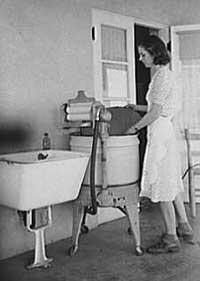Electricity and the Housewife
 In the late 1800s, when many electric technologies were being introduced to the public, few women were working as inventors or electrical engineers. Up until the 1950s (and even after that, to some extent), most women did not have access to the types of education or technical know-how gained from life experience that would have allowed them to work alongside men in laboratories such as Thomas Edison’s “Invention Factory.” One of the ways women did contribute, however, was in the design of the first electrical technologies.
In the late 1800s, when many electric technologies were being introduced to the public, few women were working as inventors or electrical engineers. Up until the 1950s (and even after that, to some extent), most women did not have access to the types of education or technical know-how gained from life experience that would have allowed them to work alongside men in laboratories such as Thomas Edison’s “Invention Factory.” One of the ways women did contribute, however, was in the design of the first electrical technologies. In their roles as housewives, for instance, middle-class women ran households, which required huge amounts of labor as well as management skills. They were also the ones who generally made decisions about what products and appliances to buy for the home and how things in the home would be used. This decision-making power meant that women as a group had a say in which electrical products succeeded and which failed. Many household appliances, for example, fell by the wayside—not because they didn’t work, but because housewives didn’t find them useful. By using their power as consumers, women played an indirect, but extremely important, role in shaping the history of electrical technology.
The early impact of electricity in the home occurred in the homes of the wealthy and the middle class. These homes got electricity first. Many wealthy women were highly educated and felt strongly that running a household should be like managing a small business. Just as real businesses were employing new technologies and managerial science to improve efficiency, many housewives at the time believed that the use of technology in the home would improve the efficiency of household tasks. Encouraged by women's magazines housewives strived to become "household engineers". For most people in the U.S. and Europe, however, those changes did not occur until the period between about 1930 and 1950, when governments took action to promote the provision of electricity to homes.
However, the introduction of electric appliances in the home sometimes had unexpected results. It is true that electric clothes washing machines, vacuum cleaners, and other appliances made housework more efficient. But often they had the effect of raising the minimum standard of household cleanliness. When once it had been enough to clean carpets once every season, women were now expected to keep them spotlessly clean all the time with vacuum cleaners. Ironically, the overall result of laborsaving electrical appliances was often more work for women. But even if the results were not always in their favor, women still wielded great power through their purchasing decisions.
TODAY is for overdue laundry here, thankful I have new appliances, electricity and no hard labor for running this household. (smiling)
Effective Feb 2006 All comments have been saved and hidden due to transferring to Haloscan 12 Comments






































<< Home